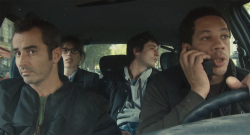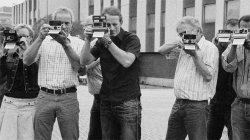Reviews
Maïwenn
France, 2011
Credits
Review by Katherine Follett
Posted on 09 May 2012
Source 35mm print
Categories The 2012 Independent Film Festival Boston
Polisse, winner of the Jury Prize at the Cannes Film Festival, is a collage of characters, narratives, and tones centered around a Parisian child-protection police unit. According to the titles, the film uses actual events from the files of a real-life CP unit, and the gritty realism is evident throughout the film. It aims for a picture of the underbelly of life that is at once broad and biting, and it is successful most the time.
Though the cases we see - molestation, exploitation, heartbreaking poverty - are gripping, the main focus of this drama is the officers themselves. For most of the film, this makes for an unsettlingly realistic look into the lives of people who deal with the worst of humanity. In the face of tragedy, the officers are sometimes blasé, sometimes mocking, sometimes furious, and sometimes crushed. The entire unit (and the audience) is nearly nauseated at the inconsolable screams of a boy whose mother has no choice but to surrender him to a shelter so he won’t have to live with her on the streets. A few minutes later, the officers can’t stifle a giggling fit at an underage girl who agreed to give several boys oral sex in order to get back her cell phone. Throughout the film, we also see bits of the ordinary events that carry emotional weight with the officers despite the heightened drama of their jobs—political arguments with coworkers, troubled marriages, the minutia of parenthood. These scenes weave together to provide a lived-in, relatable picture of ordinary people in extraordinary circumstances.
At times, the film exposes the officers’ personal lives with a too-heavy hand. One officer, a woman of Arab descent, explodes into a tirade against a Muslim father, ranting against Islamic patriarchy in a way that sounds a bit forced, in addition to being professionally way out of line. Toward the end, two female officers, former friends, end up in a fight that feels similarly abrupt and false given their previous closeness.
The film is haphazardly put together, with quick editing, a huge load of characters, and cases that weave in and out without resolution. At times, this style is immersive, and I’m grateful that the filmmakers managed to stay away from the reality-TV hand-held-camera technique that seems to have overtaken “naturalistic” US films. (In my opinion, retaining the fourth wall allows the viewer to remain immersed, without noticing the camera and, inevitably, ourselves.) On the other hand, the film’s style doesn’t allow scenes and characters to unfold in anything like real time or even narrative time, causing an abruptness that undermines the storytelling. This is most evident in the ending, when an officer suddenly commits suicide. Because we haven’t had much chance to live with her story, her end feels inexplicable and way out of line with anything that came before, yet has little of the emotional weight I think the filmmakers hoped for.
Despite these lapses, Polisse is a powerful document of how people deal with impossible situations. It is a brilliant example of how to show the strengths of an ensemble cast. It sustains the feeling of never-ending struggle that clearly hounds its characters, yet manages to do so without losing a certain cigarette-smoking, meal-enjoying languidness that seems unmistakably French. The film, even with its flaws, is an interesting and welcome change of pace from ubiquitous American police dramas.
More The 2012 Independent Film Festival Boston
-

Beauty is Embarrassing
2012 -

Gregory Crewdson: Brief Encounters
2012 -

Sleepwalk with Me
2012 -

Liberal Arts
2010 -

Burn
2012 -

All-Ages: The Boston Hardcore Film
2012 -

Polisse
2011 -

Sun Don’t Shine
2012 -

Headhunters
2011 -

Cerro Rico, Tierra Rica
2011 -

Time Zero: The Last Year of Polaroid Film
2011 -

Jason Becker: Not Dead Yet
2012 -

Detropia
2012 -

Girl Model
2011 -

Under African Skies
2012 -

The Central Park Effect
2012 -

Paul Williams: Still Alive
2011 -

Trishna
2012 -

The Queen of Versailles
2012
We don’t do comments anymore, but you may contact us here or find us on Twitter or Facebook.



